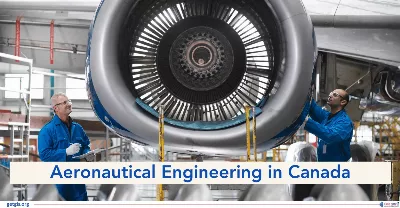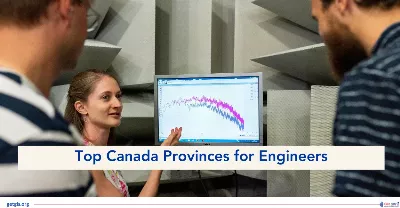Aeronautical Engineering in Canada in 2025-26: Top Universities, Requirements, Cost, and More
Updated On
-
Copy link
-
-
Pursuing Aeronautical Engineering in Canada in 2025-26 offers access to cutting-edge research, world-class universities, and strong industry ties. Graduates can explore jobs across top aerospace firms like Bombardier, Boeing, and Pratt & Whitney.
Limited-time offer : Access a free 10-Day IELTS study plan curated for you

Table of Contents
- Why Study Aeronautical Engineering in Canada?
- Top Universities for Aeronautical Engineering in Canada
- Eligibility Criteria for Aeronautical Engineering in Canada
- Documents Required for Aerospace Engineering Courses in Canada
- Cost of Studying Aerospace Engineering in Canada
- Jobs After Aeronautical Engineering in Canada
- Build Your Career in Aeronautical Engineering in Canada with ����ÿ�մ���
Aeronautical Engineering in Canada in 2025-26 is gaining traction due to the country's expanding aerospace sector. Top universities like the University of Toronto, McGill University, and Carleton University offer cutting-edge programs in areas such as aircraft systems, propulsion, and aerodynamics.
The field offers promising career paths, with starting salaries typically ranging from CAD 65,000 to CAD 80,000 and roles at industry leaders like Bombardier, Airbus, and CAE Inc. Canada also hosts numerous aerospace firms, employing nearly 200,000 skilled professionals. Let’s explore the top universities, eligibility, costs, and career scope in this dynamic domain.
Why Study Aeronautical Engineering in Canada?
Canada stands out as a top destination for aeronautical engineering due to its globally ranked universities, thriving aerospace sector, and strong career prospects. With world-class education and industry-aligned programs, students receive hands-on experience and job-ready skills. The country’s investment in aviation and aerospace innovation adds further value to this career path.
- Global Recognition:��Nine Canadian universities feature in the top 200 of the QS World University Rankings, ensuring global credibility for your degree.
- Attractive Salary Packages:��Aeronautical engineers in Canada earn an average salary of CAD 89,173, offering great returns on educational investment.
- Robust Aerospace Workforce:��Canada supports nearly 200,000 aerospace professionals, creating a wide talent network and strong employment ecosystem.
- Strong Economic Contribution:��The aerospace sector added over CAD 24 billion to Canada’s GDP in 2021, reflecting its importance and growth potential.
- Industry Collaboration:��With major players like Bombardier and Airbus operating in Canada, students benefit from research ties, internships, and job placements.
Also Read:��Best Benefits of Studying in Canada in 2025
Top Universities for Aeronautical Engineering in Canada
Canada offers some of the world’s best institutions for aeronautical and aerospace engineering, known for academic excellence and research innovation. These universities are known for advanced research facilities, skilled faculty, and high graduate employability. Here is a list of the top institutions offering aeronautical engineering programs.
|
University |
QS Ranking |
Average Tuition Fees (CAD) |
Average Tuition Fees (INR) |
|
McGill University |
27 |
29,780 |
18,87,868 |
|
University of Toronto |
29 |
31,870 |
20,20,361 |
|
University of Alberta |
94 |
25,000 |
15,84,845 |
|
University of Waterloo |
119 |
53,000 |
33,59,872 |
|
University of Calgary |
211 |
22,000 |
15,84,845 |
|
Concordia University |
465 |
35,625 |
22,58,405 |
|
Toronto Metropolitan University (TMU) |
711-720 |
38,472 |
24,38,887 |
|
Carleton University |
781-790 |
53,613 |
33,98,733 |
Quick Read:��Aerospace Engineer Salary in Canada in 2025
Eligibility Criteria for Aeronautical Engineering in Canada
To pursue Aeronautical Engineering in Canada, applicants must meet specific academic and language requirements based on their level of study. Below are the key eligibility requirements for the program.
- Academic Background (Undergraduate):��Students should have completed 10+2 with Physics and Mathematics as core subjects. A strong foundation in science is essential for undergraduate admission.
- Academic Background (Postgraduate):��A relevant bachelor's degree in engineering or a related discipline is required, with a minimum GPA of 3.0 (or equivalent).
- English Proficiency:��Most universities ask for an IELTS score between 5.5 and 6.0 for UG and Diploma programs. Postgraduate and doctoral programs generally require an IELTS score of at least 6.5, with some programs demanding higher scores.
- Work Experience:��For postgraduate courses, having 2-3 years of industry experience in a related field can strengthen your application.
- Standardized Tests:��Competitive GRE or GMAT scores may be required for certain master’s or PhD programs, especially those focused on research or management.
Explore:��Canada Student Visa (2025): Requirements, Process & Fees
Documents Required for Aerospace Engineering Courses in Canada
To apply for Aerospace Engineering programs in Canada, you will need to prepare a complete set of academic and personal documents. These materials help universities evaluate your eligibility, background, and motivation. Below is a list of essential documents for the course.
- Academic Transcripts:��Provide certified copies of your previous academic records along with detailed mark sheets from all institutions attended.
- Proof of English Proficiency:��Submit valid IELTS, TOEFL, or equivalent test scores to demonstrate your command of the English language.
- Standardized Test Scores:��Undergraduate applicants may need SAT or ACT scores, while graduate programs often require GRE scores.
- Resume or CV:��Highlight your academic background, technical skills, internships, and any relevant experience in a concise format.
- Letters of Recommendation:��Include 2-3 reference letters from professors or professionals who can attest to your academic or work capabilities.
- Statement of Purpose (SOP):��Write a clear and focused essay explaining your interest in aerospace engineering and your future goals.
- Financial Documents:��Provide bank statements, sponsor letters, or other proof showing your ability to fund your education and living expenses.
- Passport Copy:��Submit a scanned copy of your valid passport for identity and visa processing purposes.
Note:��It is crucial for applicants to carefully review the specific document requirements outlined by each university and program before applying.
Check Out:��List of Documents Required for Canada Student Visa Process from India in 2025
Cost of Studying Aerospace Engineering in Canada
Studying Aerospace Engineering in Canada involves careful consideration of various costs, including tuition fees, living expenses, and additional expenditures. Here's a breakdown to help you plan financially.
1. Tuition Fees
Tuition fees for Aerospace Engineering programs in Canada can vary based on the level of study (undergraduate or graduate) and the chosen institution.
|
Program |
Average Tuition Fees (CAD) |
Average Tuition Fees (INR) |
|
BSc/ BEng in Aerospace Engineering |
35,000 - 45,000 |
22,18,784 - 28,52,722 |
|
MSc/ MEng in Aerospace Engineering |
20,000 - 35,000 |
12,67,876 - 22,18,784 |
|
PG Diploma in Aerospace Engineering |
14,000 - 19,000 |
8,87,513 - 12,04,482 |
|
Ph.D. in Aerospace Engineering |
7,000 - 17,000 |
4,43,756 - 10,77,695 |
2. Accommodation
The cost of accommodation depends on whether you choose on-campus residence, off-campus housing, or homestays. On-campus housing can range from CAD 8,000 to CAD 15,000 per year, while off-campus options may vary widely based on location and amenities.
3. Living Expenses
Estimated living expenses, including food, transportation, utilities, and miscellaneous costs, can average around CAD 12,000 to CAD 15,000 per year. However, actual expenses may vary based on lifestyle choices and the city of residence.
Suggested Reading:��Cost of Living in Canada 2025: For Students & Immigrants
Jobs After Aeronautical Engineering in Canada
Aeronautical Engineering graduates in Canada find employment in leading sectors like aerospace design, defence technology, and aviation services. With the country's aerospace industry contributing over $24 billion to GDP and employing thousands, career prospects remain strong. Below is a list of popular job roles and their average salaries.
|
Job Title |
Average Annual Salary (CAD) |
Average Annual Salary (INR) |
|
Air Crew Officer |
81,200 |
51,47,579 |
|
Aircraft Maintenance Technician |
54,800 |
34,73,981 |
|
Aircraft Maintenance Supervisor |
127,000 |
80,51,016 |
|
Aerospace Engineer |
154,000 |
97,62,649 |
|
Aerospace Technician |
113,000 |
71,63,502 |
|
Aircraft Engineer |
125,000 |
79,24,228 |
|
Airlines Structural Assembler |
56,300 |
35,69,072 |
Top Companies for Aeronautical Engineering in Canada
Canada is home to many globally recognized aviation and aerospace firms that contribute significantly to innovation and employment. Here is a list of top companies in Canada known for hiring aeronautical engineers and their average salaries.
|
Company Name |
Average Salary (CAD) |
|
Bombardier |
80,000 - 110,000 |
|
Pratt & Whitney Canada |
85,000 - 115,000 |
|
Magellan Aerospace |
75,000 - 100,000 |
|
CAE Inc. |
78,000 - 105,000 |
|
MDA Space (formerly MDA Ltd.) |
90,000 - 120,000 |
|
Airbus Canada |
82,000 - 112,000 |
|
Boeing Canada |
88,000 - 118,000 |
|
Lockheed Martin Canada |
90,000 - 125,000 |
Also Read:��How to Get a Job in Canada from India in 2025?
Build Your Career in Aeronautical Engineering in Canada with ����ÿ�մ���
In concluding our exploration of Aeronautical Engineering in Canada, it's evident that this journey offers not only academic excellence but a gateway to innovation and limitless possibilities in the aerospace industry. As you envision your future amidst the clouds of discovery, it's crucial to have a reliable guide on your side.
����ÿ�մ�����emerges as the ideal immigration consultant, offering expertise in navigating the intricate pathways of immigration. Let the skies be your canvas, and with ����ÿ�մ��� as your partner, watch your dreams take flight in the realm of Aeronautical Engineering in Canada. The sky is not the limit-it's just the beginning.
Useful Links:
Limited-time offer : Access a free 10-Day IELTS study plan curated for you

Frequently Asked Questions
What is the hardest subject in aeronautical engineering?
What is the Specialization or Speciality of aeronautical engineering?
Which country is the most desired for aeronautical engineering?
What are the key skills required for success in aeronautical engineering?
Are internships or practical experiences crucial in aeronautical engineering programs?





